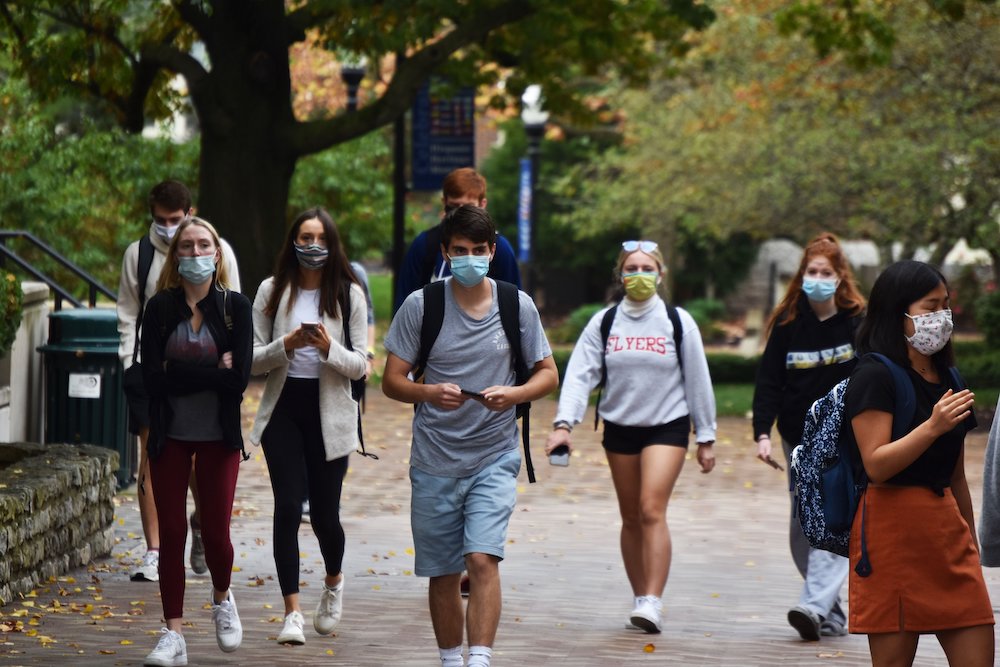
In just a few years, the number of citizens carrying student loan debt has increased. The average amount carried, and the total amount owed nationwide have increased as well. (Pixabay/Quince Creative/3D Animation Production Company)
Many of us were disappointed recently, by reports that President Joe Biden was unwilling to support canceling student loan debt up to $50,000. Student loan debt is not merely a problem for the culture and economy in the United States; it is a genuine crisis.
Over 45 million citizens — about one sixth of the population — are burdened with student loans. The average amount of these loans is approximately $33,000. Total student loan debt in this nation amounts to $1.56 trillion. For perspective, that's about 18% of the entire national debt carried by the U.S. itself. Racial and gender equality issues are relevant here, also. Women owe almost two thirds of the student loan debt in this nation, and Black and Hispanic students carry higher debts than their white counterparts.
This situation isn't improving. In just a few years, the number of citizens carrying student loan debt has increased. The average amount carried, and the total amount owed nationwide have increased as well. Indebted citizens in the workforce face declining prospects as wages stagnate and the price of living skyrockets. Many of us who have been paying off our loans for years are wondering whether we will ever be able to retire. Many of us expect to carry this debt to our deathbeds. Minor fixes, such as the Secretary of Education's plan to cancel $1 billion in debt for those who were defrauded by universities — a plan estimated to help approximately 72,000 persons — are only tiny steps in the right direction.
This crisis is not only economic. It is moral as well, because it pertains to fundamental human rights, the intrinsic value of the person and the dignity of work. A society in which persons are burdened with so much debt that decades of work can not lift them out of poverty is an unjust society; policies that militate against fixing this are immoral policies.
Advertisement
As Catholics, we believe that human persons have a right to an education. This is the magisterial teaching of the church, as stated in the Second Vatican Council's Declaration on Christian Education, Gravissimum Educationis:
All men of every race, condition and age, since they enjoy the dignity of a human being, have an inalienable right to an education that is in keeping with their ultimate goal, their ability, their sex, and the culture and tradition of their country, and also in harmony with their fraternal association with other peoples in the fostering of true unity and peace on earth.
The magisterial teaching of the Catholic Church also favors debt forgiveness. And while this concept may look radical to those brought up with laissez-faire capitalism as the norm, debt forgiveness has ancient roots, going back to the Hebrew tradition of the "Jubilee year" when all debts were canceled, and fields let to lie fallow. Even if it were not the case that debt forgiveness could boost the economy and increase upward mobility, it is a condition of justice that every Christian should embrace.
No one should be deprived of the opportunity to fully flourish as a rational creature, oriented toward an understanding of the true and the good, in community with others. And no one should be denied resources to rise out of financial desperation, whether those resources involve a liberal arts education, training in a trade, affordable tools to perform their work, or health care should they get sick or injured. Those who worked hard to train for meaningful labor should not be struggling to make ends meet, unable to pay medical bills or ever hope for retirement. Yet this is the reality for millions of workers in the United States, across the career spectrum — because we have elevated an ideal of an unregulated economic system above concern for the common good.
In a nation as wealthy as ours, it is shameful that we have let it come to this. Student loan forgiveness and affordable college are only part of the fix for our ever-worsening economic situation, but they are essential components in a program to institute a humane and just society.
Yet many believe student loan forgiveness is impossible, impractical, or even wrong. "You took out the loan. You should have to pay it back." That's the argument we can expect to hear. This argument is hollow, however. Due to accumulating interest, many borrowers have already paid well over the amount they originally took out, and still carry tens of thousands in debt.
Another popular argument against loan forgiveness is that it is unfair to those who have paid their debts already. While I agree that these persons were subjected to injustice, the injustice is that they had to pay so exorbitantly in the first place — not that others might have their loans forgiven. Inflicting an injustice on others simply because it was inflicted on you is hardly the solution to inequity.

Would student loan forgiveness stoke resentment among those who didn't go to college? Pictured are students walking on campus at the University of Dayton in Ohio during the fall 2020 semester. (CNS/Courtesy of the University of Dayton)
Biden's concern, that a forgiveness plan would entail forgiving the debts of the privileged who attended Ivy League schools, has some merit. However, as a recent article from NPR details, few who carry student loan debt today attended elite institutions. The notion of the college-educated demographic as an elite group is largely illusory. Many people in lower-middle-income jobs have college educations. And many working-class persons make substantial incomes and can retire early and comfortably.
Would student loan forgiveness stoke resentment among those who didn't go to college, however? Would it further widen the gap between the college educated and those in the trades? This is the view of Michael Sean Winters, writing here at NCR. Winters holds that such a move would provoke anger in the working classes, driving them back into the arms of Donald Trump.
But this argument hinges on the idea that the MAGA movement was driven primarily by class resentment. It perpetuates the "forgotten man" stereotype of the Trump voter as a low-income laborer driven to desperate straits in an unfeeling economy. This "forgotten man" is invariably imagined as white and rural, to the erasure of the many non-white urban working-class voters who lack access to higher education.
While it is true that working class and lower-income persons are finding it increasingly hard to survive, let alone thrive, in our present neoliberal economy, the image of the Trump voter as overwhelmingly low-income or working class is inaccurate. This image exists partially because urban viewers mistake much of what looks rural — trucks, tractors, a dumpster in the front yard — as "poor." In reality, many rural Trump voters are extremely well off, especially considering average local income. Trucks and tractors don't run cheap. Even a front-yard dumpster and a trash service to handle it can be pricey.
But it is also inaccurate that the MAGA movement is best understood in terms of lower-income or working-class identity. Quite the contrary: In 2020, Biden held the lead among voters with incomes under $100,000. Those with incomes of $100,000 and up tended to favor Trump, according to exit polls. Moreover, in terms of education, while those with graduate and post-graduate degrees overwhelmingly voted for Biden in 2020, Trump held a slight lead among voters who held an associate's degree.

While it is true that working class and lower-income persons are finding it increasingly hard to survive, let alone thrive, in our present neoliberal economy, the image of the Trump voter as overwhelmingly low-income or working class is inaccurate. This image exists partially because urban viewers mistake much of what looks rural — trucks, tractors, a dumpster in the front yard — as "poor." (Wikimedia Commons/Daniel Oines)
Clearly the factors driving our voting patterns are complex. But it seems statistically clear that while education is a factor, the greatest divide in our nation has to do with racial identity and race issues. MAGA is not a movement of the working class or the lower income. It is a movement of white supremacy. And white supremacy has a greater foothold in small towns and rural areas. This due partially to lack of diversity, though less access to education is probably a factor, too.
So, would better access to education disarm some of the impetus behind the MAGA movement? Of that I am unsure. I think it depends more on the nature of the education. And the fact remains that plenty of people are uninterested in college and prefer to pursue blue-collar careers that they are good at, proud of, and enjoy — and that can be extremely lucrative.
Would student loan forgiveness and free college be unjust to these workers? Would they be understandably resentful at being asked to finance the education of potentially white-collar workers? Would such a policy be fundamentally inequitable, giving extra privileges to many already occupying spaces in society deemed worthy of additional respect?
This is a legitimate concern. But it is not insurmountable. For one thing, a well-crafted plan for loan forgiveness would have a preferential option for those most in need and come with caveats to prevent the well-off from taking advantage of it. But more importantly, student loan forgiveness and affordable tuition cannot happen in a vacuum. They need to be part of a comprehensive program of economic justice. In such a program, all lines of work would be deemed equally worthy of respect. And all workers would have access to the support and funding necessary to pursue career success and financial stability.
One reason why laborers might justly resent societal investment in the success of the college-educated is that pursuing a trade takes a lot of work, and can cost a lot of money. Simply purchasing, insuring and maintaining a reliable truck for a construction business can be as costly as a college education. And unlike a college education, a truck wears out and must be replaced. Those entering trades and blue-collar fields also deserve the support and resources they need.

Plenty of people are uninterested in college and prefer to pursue blue-collar careers that they are good at, proud of, and enjoy — and that can be extremely lucrative. Would student loan forgiveness and free college be unjust to these workers? (Pixabay/Michael Gaida)
Training and schooling should be available, necessary equipment should be affordable, and no worker should ever fear insolvency due to lack of health care or periods of low demand.
We also need increased awareness of the dignity of physical work. In my experience as an academic, I have seen too many fellow intellectuals sneer at those they rely on to repair their homes, fix their vehicles and rescue them when their plumbing fails. This is unjust and increases the divide between the laborers of the mind and the laborers of the body. I've seen the same thing in reverse, as well: Blue-collar workers disdain the labor of intellectuals, whether ethicists, scientists or medical professionals. Both these prejudices are deeply harmful to individuals and society. In a truly just society, all workers should be united.
The need for this is highlighted when we observe how desperate things are for many in supposedly elite fields. When I was an adjunct college instructor, I did work that required years of expensive schooling and specific intellectual abilities but was compensated so poorly I couldn't rise above the poverty line, even when taking side jobs. The dire situation of adjunct faculty in the United States is proof that we have failed to value laborers of the mind as well as those of the body. White-collar and blue-collar workers must unite against economic injustice, demanding fair wages for all workers in all fields.
Uniting in a shared cause would help in eliminating some of the class divides in our nation, especially when we realize that many class divides have more to do with lifestyle than with actual financial success.
But there are also real divides in our nation, between the haves and the have-nots — between those who can pursue their dreams and those who feel hopeless, trapped in low-paying jobs with no opportunities to better their lives. Making college and career training available to anyone who desires it and proves aptitude, regardless of economic class, could eliminate some of these divides.








